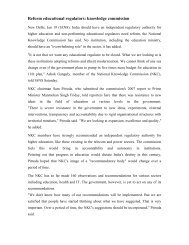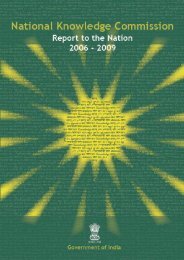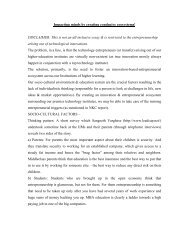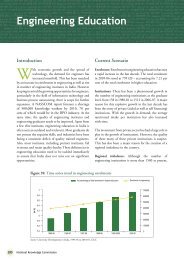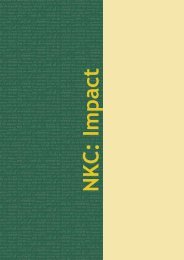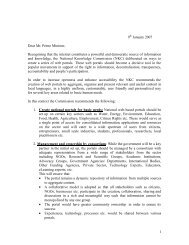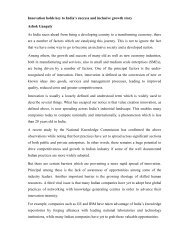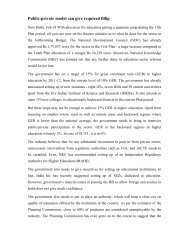National Knowledge Commission Report to the Nation 2009: Overview
National Knowledge Commission Report to the Nation 2009: Overview
National Knowledge Commission Report to the Nation 2009: Overview
You also want an ePaper? Increase the reach of your titles
YUMPU automatically turns print PDFs into web optimized ePapers that Google loves.
<strong>the</strong> Agricultural Technology Management Agency<br />
(ATMA) <strong>to</strong> make it more decentralised, participa<strong>to</strong>ry<br />
and locally responsive, and enhancing <strong>the</strong> role of<br />
private players in agricultural extension delivery.<br />
• Enhancing Quality of Life: NKC has focused<br />
on knowledge applications for enhancing <strong>the</strong><br />
well being of common people, especially in rural<br />
areas. Towards this end, NKC has recommended<br />
<strong>the</strong> setting up of Panchayat Gyan Kendras<br />
(PGKs) throughout <strong>the</strong> country which would<br />
ensure efficient implementation of NREGA and<br />
would eventually develop in<strong>to</strong> resource centres <strong>to</strong><br />
demonstrate best practices, evolve local solutions<br />
and provide a platform for converging different<br />
social sec<strong>to</strong>r programs. NKC has also recommended<br />
conceptualising fresh perspectives in <strong>to</strong>ol design<br />
<strong>to</strong> improve dignity of labour and ensure skillful<br />
engagement and enhanced productivity.<br />
SERVICES<br />
For <strong>the</strong> creation of a true knowledge society, <strong>the</strong><br />
availability of efficient knowledge services for citizens<br />
is critical, especially for enhancing citizen-government<br />
interface. Technology provides us with an opportunity<br />
<strong>to</strong> ensure accountability, transparency and proficiency<br />
in government services. E-governance is one of <strong>the</strong><br />
ways in which citizens can be empowered <strong>to</strong> increase<br />
transparency of government functioning.<br />
• E-governance: To enhance <strong>the</strong> efficacy of delivery<br />
of services by <strong>the</strong> government, NKC has reiterated<br />
that e-governance should be an opportunity not<br />
merely for computerisation of age old processes,<br />
but a step <strong>to</strong>wards re-thinking our systems and<br />
processes <strong>to</strong> ensure greater efficiency and citizen<br />
orientation. NKC recommendations focus on<br />
re-engineering government processes <strong>to</strong> change<br />
<strong>the</strong> basic pattern of governance for simplicity,<br />
transparency, productivity and efficiency. They<br />
highlight <strong>the</strong> need for developing common<br />
standards and deploying a common platform/<br />
infrastructure for e-governance. Fur<strong>the</strong>r, 10 <strong>to</strong> 20<br />
important services that make a critical difference<br />
<strong>to</strong> citizens may be selected, simplified and offered<br />
as web-based services, along with beginning all<br />
new national programs (like Bharat Nirman, Rural<br />
Employment Guarantee Scheme etc.) with wellengineered<br />
e-governance implementation and<br />
web interface. This will ensure speedy delivery,<br />
productivity and efficiency of services making<br />
<strong>the</strong>m citizen centric and ensuring that <strong>the</strong> right<br />
people get <strong>the</strong> benefits.<br />
<strong>Report</strong> <strong>to</strong> <strong>the</strong> <strong>Nation</strong><br />
17



